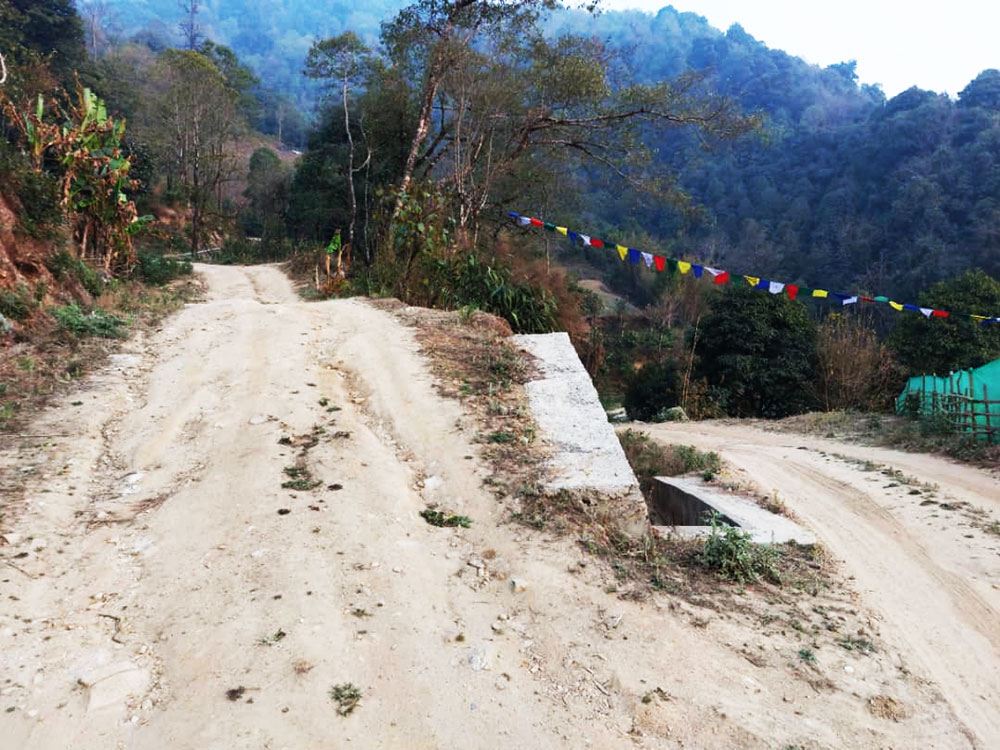Choki Wangmo | Tsirang
In the current Plan, the government has allocated a total of Nu 5.05 billion for new farm road construction and maintenance.
However, local government (LG) leaders say that the quality of farm roads would continue to suffer because of poor implementation of guidelines.
Findings of the Royal Audit Authority showed that there is execution of sub-standard works, non-rectification of damaged work, financial irregularities, irregular grant of time extension and delay in taking over of the completed farm road works.
The guideline mandates that the formation of the Dzongkhag Technical Committee (DTC), to whom the gewog tshogdu (GT) would submit the proposal for assessment and recommendations; the dzongkhag tshogdu (DT) would provide approval for farm road development works.
The issue of non-implementation of the guidelines was recently raised in the Dagana DT. A dzongkhag official said that despite such requirements, the ground implementation never happened, leading to poor work quality.
“The DTC was never formed. The farm road proposals were not submitted to DT for approval and LG members were not aware about it,” he said, adding that the reasons for poor farm road conditions, particularly during monsoon, could be a result of not following the guidelines.
The guidelines state that the Department of Agriculture is responsible to enforce and institutionalise the farm road construction.
Currently, without a DTC, the dzongkhag and gewog tender committees monitor the planning process of farm road constructions at the dzongkhag and gewog levels, functioning as a DTC.
However, according to officials, this has been challenging and has been repeatedly discussed in many DTs.
Dzongkhag agriculture officer of Trongsa said that there is no DTC and dzongkhag tender committee is executing the works of DTC and the members in both committees are the same.
Officials from the Sarpang’s agriculture sector said that most farm roads did not meet screening criteria as per the guidelines. “But, there are villages in need of roads. The planning process is done as per the guideline. Few technical requirements couldn’t be met.”
The proposal for the farm road in the dzongkhag is passed from GT and is approved by the DT.
Tsirang’s senior dzongkhag agriculture officer, Dorji Gyeltshen, said that DTC wasn’t formed but the dzongkhag tender committee and the dzongkhag environment sector scrutinise the procedure and criteria. “We do not seek DT’s approval as its approved in two layers of committees.”
According to sources, the guidelines couldn’t be followed as in one of the meetings with the LG members, the finance minister said that the LG can facilitate farm road development beyond chiwogs.
Dzongkhag agriculture officers, however, said that LG members were informed about the farm road guidelines.
Dagana dzongdag, Duba, said that although LG members were provided the guidelines, it was observed that the provisions of the guidelines were not followed.
In the recent DT, the dzongkhag informed the LG members about the provisions of the guidelines and endorsed practical guidelines for development of farm road in the dzongkhag.
He said that, henceforth, the GTs will prioritise farm roads based on the criteria set and the dzongkhag environment committee will function as the DTC.
“The committee will review and submit to DT for final approval,” Duba said.
Larjab Gup Dhan Bdhr Gurung said that the implementation of the guidelines would improve the quality of farm roads. He said that although the gewog tender committee carries out the function, interventions and guidance from the DTC would help in developing sustainable farm roads. “Instances of mishaps and project failures could be reduced too.”
Annually, gewog administration spends about 40 percent of its budget in farm road construction and development.
Gakidling gup, Nim Dorji Sherpa, said there was a risk of increased goongtong in the rural areas if the number of households was not revised. “Later, the roads were constructed based on the number of thram holders,” he said.
He added that it was difficult to build the roads as per the guideline as the villages spread scattered over the hills and fragile stretches in the dzongkhag.
“We had to avoid farm road development in waters sources and flood-prone areas. The gradient becomes high in such a situation. Some landholders won’t give their land. These are a few complicated issues in the ground,” said Nim Dorji Sherpa.
LG officials say that monitoring and implementation play a critical role to improve the quality of work.
“We need people in the field monitoring the works. Engineers will now be pooled to dzongkhags. Monitoring development activities would be challenging in gewogs,” he said.
According to the chief engineer from the agriculture department, Karma Tshethar, although the LGs show appreciation for the guidelines, in practice, it is time-consuming and there are constraints in regards to human resources of the ministry to monitor all the farm roads in the country.
“The planning and budget for construction of the farm roads is decided by the local governments, and the guideline was issued to help them,” Karma Tshethar said.
Karma Tshethar said: “The Ministry of Agriculture and Forests has no legal role in the planning of construction of farm roads and implementation of the guidelines.”
The ministry provides technical support to conduct surveys, design, and estimate budget, he said. “The local governments haven’t consulted us in planning and it isn’t mentioned in any policy document that we should be involved.”
Today, there are 9,882.2km of farm roads in the country.
Additional reporting by Nima, Nim Dorji, and Chhimi Dema.


